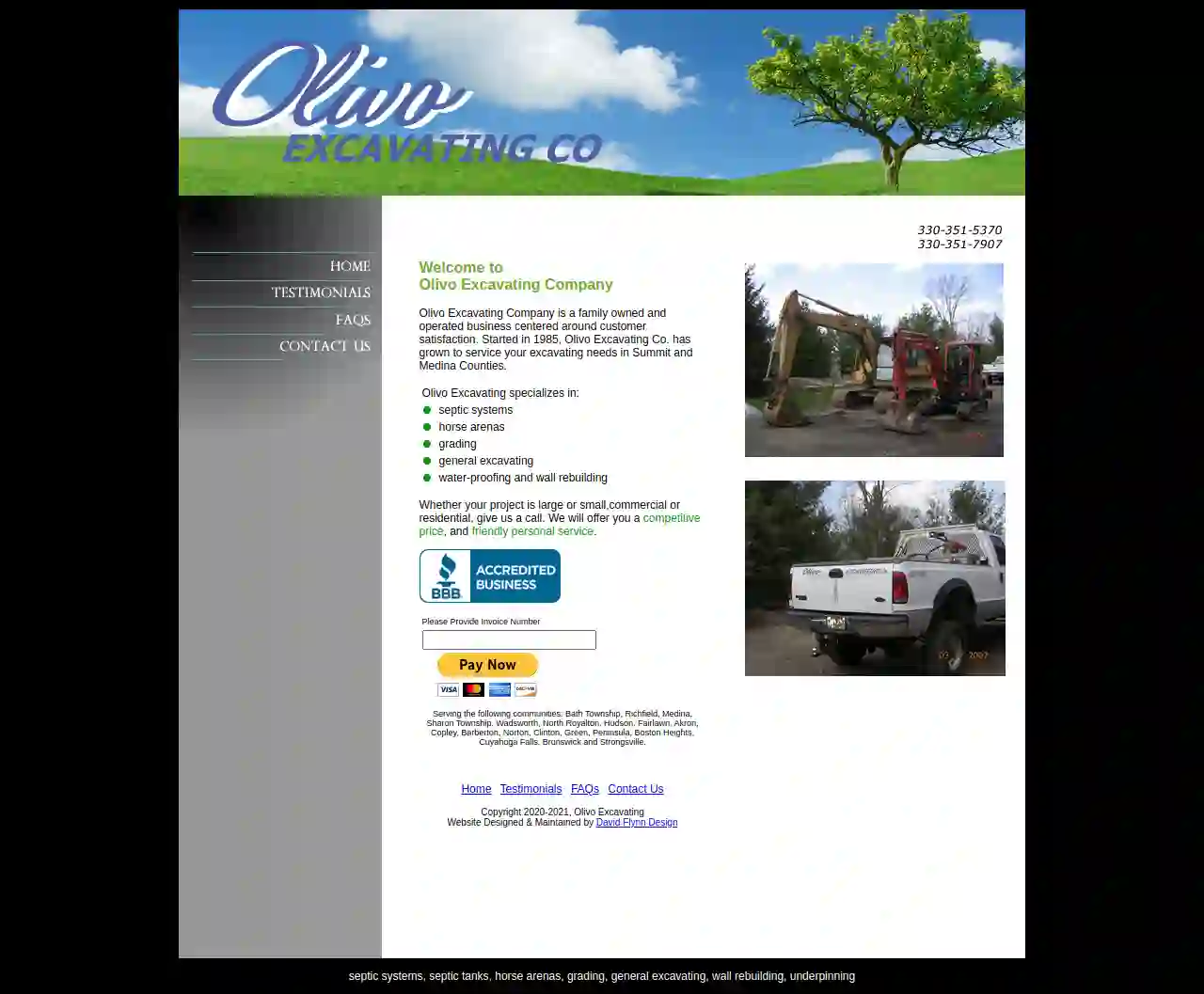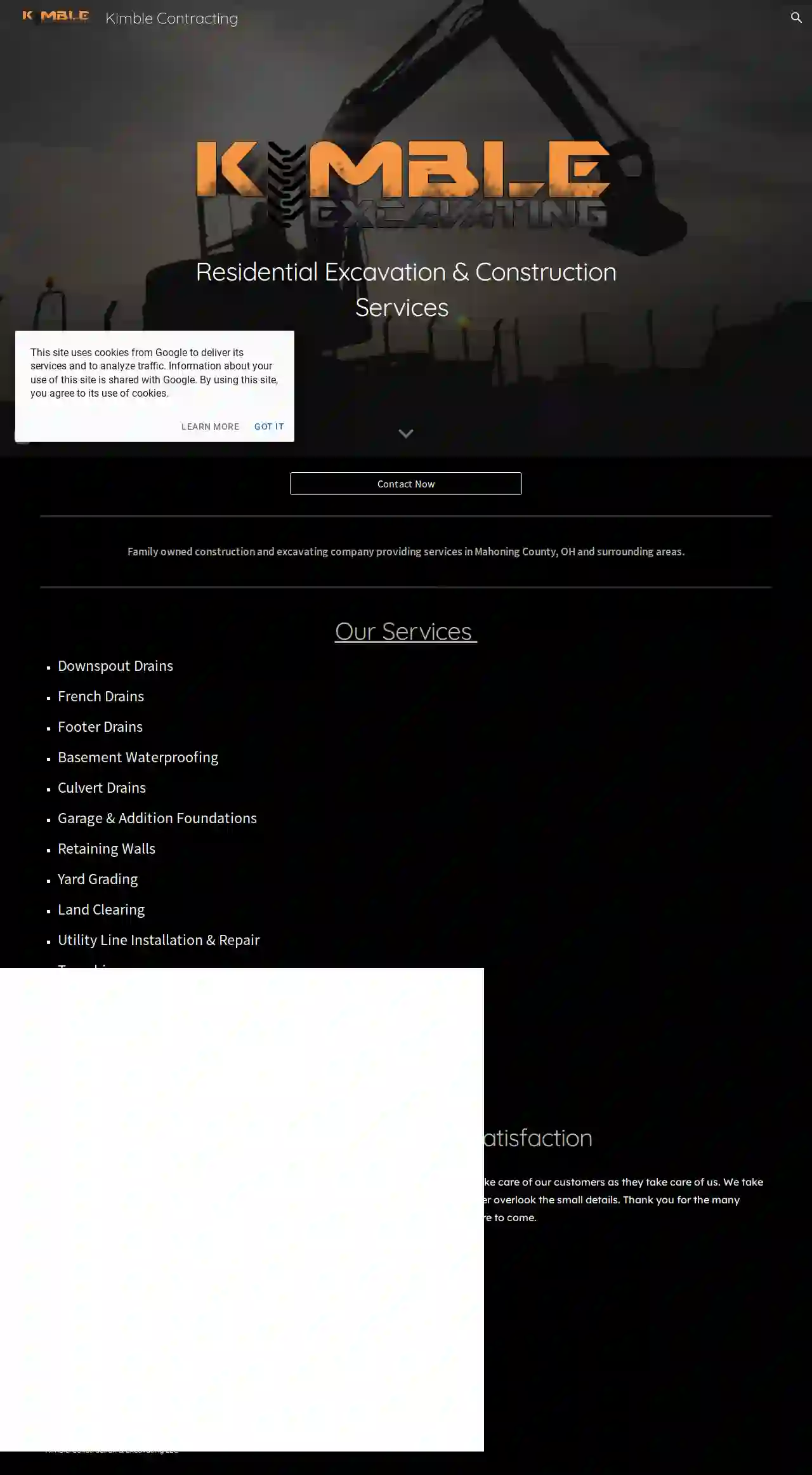Excavation Contractors Middletown
Find the best Excavation Services in Middletown
Receive up to 3 Excavation Services quotes for your project today! Compare profiles, reviews, accreditations, portfolio, etc... and choose the best offer.
- Al
Algren Excavating
52 reviewsDayton, US- Services
- Why Us?
Get Quote - Sh
Sheppard Excavating
1Cincinnati, US- Services
- Why Us?
Get Quote - Kl
Klump Excavating Construction
511 reviewsCincinnati, US- Services
- Why Us?
Get Quote 
Olivo Excavating Co
4.834 reviewsAkron, USAbout Olivo Excavating Company Olivo Excavating Company is a family-owned and operated business deeply committed to customer satisfaction. Established in 1985, Olivo Excavating Co. has expanded its services to meet the excavating needs of clients in Summit and Medina Counties. We specialize in a wide range of excavating services, including: Septic Systems Horse Arenas Grading General Excavating Waterproofing and Wall Rebuilding Whether your project is large or small, commercial or residential, we invite you to contact us. We are dedicated to providing competitive pricing and friendly, personalized service. We proudly serve the following communities: Bath Township, Richfield, Medina, Sharon Township, Wadsworth, North Royalton, Hudson, Fairlawn, Akron, Copley, Barberton, Norton, Clinton, Green, Peninsula, Boston Heights, Cuyahoga Falls, Brunswick, and Strongsville.
- Services
- Why Us?
- Testimonials
- Gallery
Get Quote
Kimble Construction & Excavating
53 reviewsYoungstown, USKimble Contracting: Your Trusted Partner for Residential Excavation and Construction Kimble Contracting is a family-owned construction and excavating company serving Mahoning County, OH, and surrounding areas. We are dedicated to providing high-quality services with a focus on customer satisfaction. Our team takes pride in our work and pays meticulous attention to detail, ensuring your project is completed to the highest standards. We understand the importance of building strong relationships with our clients. As a small business, we treat our customers like family, providing personalized attention and exceptional service. We are committed to exceeding your expectations and delivering projects on time and within budget. Thank you for considering Kimble Contracting for your next project. We look forward to working with you!
- Services
- Why Us?
- Our Team
- Gallery
Get Quote- Da
Damer digs
4.98 reviewsCincinnati, US- Services
- Why Us?
Get Quote - Ga
Garrett Excavating
534 reviewsCincinnati, US- Services
- Why Us?
Get Quote - G
G & T Excavation
1Cincinnati, US- Services
- Why Us?
Get Quote - Pe
Pettenati Escavating LLC
11 reviewsYoungstown, US- Services
- Why Us?
Get Quote - JW
JWH Excavating-Fire Protection
3.639 reviewsCincinnati, US- Services
- Why Us?
Get Quote
Over 21,512+ Excavation Pros on our directory
Our excavation pros operate in Middletown and surrounding areas!
ExcavationHQ has curated and vetted Top Excavation Companies arround Middletown. Find a reliable pro today.
Frequently Asked Questions About Excavation Contractors
- Trench Collapses: Unstable trench walls can cave in, posing a severe risk to workers. Proper shoring and sloping are crucial safety measures.
- Utility Damage: Striking underground utilities (gas, water, electric) can cause leaks, explosions, or electrocution. Accurate utility locates and careful digging are essential.
- Falling Objects: Materials or equipment falling into excavations can injure workers. Securing work areas and using appropriate safety gear is vital.
- Equipment Accidents: Operating heavy machinery involves risks of rollovers, collisions, or mechanical failures. Trained operators and proper equipment maintenance are critical.
- Environmental Hazards: Excavated soil might contain hazardous materials (asbestos, lead). Proper testing and disposal procedures are necessary.
- Basement Size: The larger the basement, the more excavation is required, increasing the cost.
- Soil Type: Excavating rocky or dense clay soil is generally more expensive than loose soil.
- Accessibility: Difficult-to-access sites might require specialized equipment or more labor, driving up costs.
- Foundation Type: The chosen foundation type (full basement, crawl space, slab) affects excavation needs.
- Underpinning: If underpinning (strengthening existing foundations) is necessary, it significantly increases costs.
- Disposal Fees: Hauling excavated soil to disposal sites adds to the overall expense.
- Project Size and Scope: The larger and more complex the excavation, the higher the cost.
- Soil Type: Different soil types require different equipment and techniques, impacting costs. Rocky or clay-rich soil can be more expensive to excavate than loose soil.
- Accessibility: Difficult-to-access sites might require specialized equipment or additional labor, increasing expenses.
- Disposal Costs: Hauling away excavated material (soil, rocks, etc.) to disposal sites incurs additional fees.
- Permits and Inspections: Depending on local regulations, permits and inspections might be required, adding to the overall cost.
- Mechanical Excavation: Utilizing heavy equipment like excavators, backhoes, bulldozers, and loaders, suitable for most projects.
- Hand Excavation: Using hand tools (shovels, picks) for smaller excavations or delicate work near utilities.
- Blasting: Employing explosives to break up rock or hard materials, typically for large-scale projects.
- Hydro Excavation: Using high-pressure water jets to loosen and remove soil, often used for locating utilities or delicate excavation.
- Vacuum Excavation: Employing a vacuum system to suck up excavated material, suitable for safe excavation near utilities or in confined spaces.
What are the risks associated with excavation?
How much does it cost to excavate a basement?
How much does excavation cost?
What are the different methods of excavation?
What are the risks associated with excavation?
- Trench Collapses: Unstable trench walls can cave in, posing a severe risk to workers. Proper shoring and sloping are crucial safety measures.
- Utility Damage: Striking underground utilities (gas, water, electric) can cause leaks, explosions, or electrocution. Accurate utility locates and careful digging are essential.
- Falling Objects: Materials or equipment falling into excavations can injure workers. Securing work areas and using appropriate safety gear is vital.
- Equipment Accidents: Operating heavy machinery involves risks of rollovers, collisions, or mechanical failures. Trained operators and proper equipment maintenance are critical.
- Environmental Hazards: Excavated soil might contain hazardous materials (asbestos, lead). Proper testing and disposal procedures are necessary.
How much does it cost to excavate a basement?
- Basement Size: The larger the basement, the more excavation is required, increasing the cost.
- Soil Type: Excavating rocky or dense clay soil is generally more expensive than loose soil.
- Accessibility: Difficult-to-access sites might require specialized equipment or more labor, driving up costs.
- Foundation Type: The chosen foundation type (full basement, crawl space, slab) affects excavation needs.
- Underpinning: If underpinning (strengthening existing foundations) is necessary, it significantly increases costs.
- Disposal Fees: Hauling excavated soil to disposal sites adds to the overall expense.
How much does excavation cost?
- Project Size and Scope: The larger and more complex the excavation, the higher the cost.
- Soil Type: Different soil types require different equipment and techniques, impacting costs. Rocky or clay-rich soil can be more expensive to excavate than loose soil.
- Accessibility: Difficult-to-access sites might require specialized equipment or additional labor, increasing expenses.
- Disposal Costs: Hauling away excavated material (soil, rocks, etc.) to disposal sites incurs additional fees.
- Permits and Inspections: Depending on local regulations, permits and inspections might be required, adding to the overall cost.
What are the different methods of excavation?
- Mechanical Excavation: Utilizing heavy equipment like excavators, backhoes, bulldozers, and loaders, suitable for most projects.
- Hand Excavation: Using hand tools (shovels, picks) for smaller excavations or delicate work near utilities.
- Blasting: Employing explosives to break up rock or hard materials, typically for large-scale projects.
- Hydro Excavation: Using high-pressure water jets to loosen and remove soil, often used for locating utilities or delicate excavation.
- Vacuum Excavation: Employing a vacuum system to suck up excavated material, suitable for safe excavation near utilities or in confined spaces.